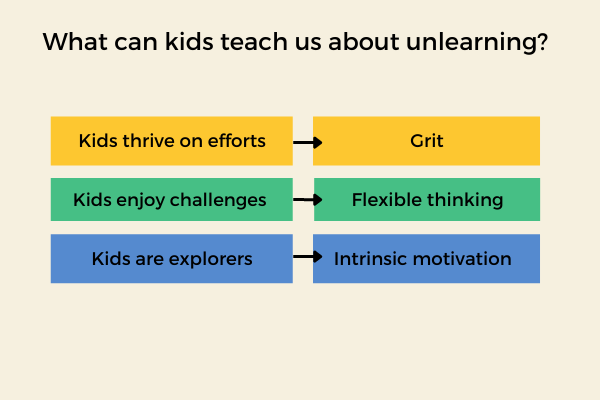Unlearning is not about erasing what we know. The process does not expect any memory deletion. Unlearning is about revising and choosing an alternative path. It’s about building an open mindset to look back, keep what works in favor of a better future and let go of the rest.
Unlearning is about letting go what doesn’t serve and adapting to newer dimensions.
Kids are born with the art of unlearning. Their development through formative years provides them opportunities to explore and find different paths to a problem.
Why are children good at unlearning?
1. Children are explorers
Imagine a child lost in her thoughts on the play mat and tinkering with a toy? While we assume that the child is wasting time or just playing with the toy, she is exploring the possibilities that the toy has to offer. Children love to explore, without boundaries or instructions.
Remember how children are able to find ways to break a toy when we thought it was impossible. That’s because they are exploring.
2. Children love problems
In my previous blog, Are You Unlearning?, I wrote about an experiment.
Imagine you have two rooms. Room ONE is occupied by three kids with a box of legos and their goal is to build a tower in 30 minutes.
Room TWO has three adults with a puzzle to solve in 30 minutes. What do you think both rooms look like?
I believe Room ONE will have three learners having a fun time and experimenting with legos together and as individuals. These learners will focus on the experience.
The reason why children love problems is because they are naturally putting their creative and critical thinking hats on. Adults are conditioned through life experiences to put on these hats on demand, whereas children are naturally designed to think beyond the ordinary.
3. Children thrive on validation in effort, more than results
While this is an unpopular opinion, through my research and experience, I believe children thrive on validation in efforts much more than results. Children are seen solving puzzles repeatedly or playing the same video game because they enjoy the process. This quality provides children with the armor to experiment, fail and not get frustrated to quit. Children showcase grit in situations of failure.
How can we be better at unlearning?
1. Let’s question the ‘fundamentals’
What worked for a generation before us, doesn’t apply today. Going to school, then college, a job and staying at it for 30 years was the norm because opportunities were limited and familial pressures dictated options.
To unlearn, we need to take a look at how things function from a lens of ‘does it work today?’ For example, the belief that you can’t change careers because you don’t have a degree is not true anymore. Let’s question the beliefs that don’t serve us.
2. Find new ways
While change is uncomfortable for most of us, it’s a bridge towards a better choice. Before starting this blog, I had unvalidated assumptions about myself like ‘I am not a writer’, ‘Who is going to read my thoughts?’, ‘Can I even write one blog?’ and many more.
These thoughts were fostered by impostor syndrome and the only way to burst out is to start taking actions. To unlearn, taking the first action is essential.
3. Create new habits
What’s the point of change if we don’t make it a habit? Through my research about habits and unlearning, I came across Polina Marinova’s podcast with Trey Lockerbie from the Investors Podcast Network.
In her episode on How Exceptional People Think, she highlights ‘Small, tiny, everyday improvements are what makes a good habit stick or what makes a bad habit fall away.’ She highlights examples of sports people, athletes and hedge fund managers who put themselves in uncomfortable situations to create better habits.
To be an unlearner, one needs to be comfortable with process of change, creating new habits and swimming through the discomfort.
Unlearning Thought
What could you do better to support your unlearning journey?
Quick note from Vishakha: Thank you for subscribing to my first newsletter :) I have been writing a blog since Jan 2022 but this is my first newsletter. Starting next week, you will receive this on Thursday. I write this newsletter to share and untangle the world of learning with you. If you like what I write, feel free to recommend it to fellow unlearners. Lastly, if you have recommendations or topic suggestions, feel free to email me at vishakhak29@gmail.com. I’d love to hear from you :)




